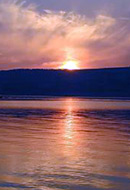And Not a Drop to Drink

With Israel's Carmel fires barely extinguished, word came in early December that the water level in the Kinneret, also known as the Sea of Galilee, was approaching the "black line" at which no more pumping could take place. At the conclusion of the driest November since 1962, already dismal forecasts of winter rain were being revised downward; they would be only slightly alleviated by a suddenly vicious storm that dumped snow and rain on the north—as if to taunt Israel as it stood on the brink of yet another abyss.
The Kinneret covers about 64 square miles; its watershed, an area of about a thousand square miles, is home to over 200,000 people. The lake plays host to two to three million people each year who come to relax, swim, and admire the landscape. Some 30 percent of Israel's potable water is pumped from the lake via the National Water Carrier, a system of pipes and reservoirs that opened in 1964. It was a technical triumph, logical and in a way compact, but it fed both agricultural and urban growth that was sprawling and unplanned.
Lakes, like forests, project a quality of timelessness, but looks are deceiving. Humans have lived around the fluctuating shores of the Kinneret for millennia; evidence of previous habitations is revealed whenever the level drops precipitously. During the 1980s, a 20,000-year-old site was uncovered bearing well-preserved seeds of wild barley and fruit. The "Jesus boat," a small 1st-century B.C.E. fishing vessel, was unveiled the same way. Dotted around the shore are ancient stone piers, further evidence of life during the time of the Gospels. If too much water erases humans, too little can cause the social fabric to evaporate.
Weather in the eastern Mediterranean is part of a planetary whole, and Israel is stuck in the middle between vastly larger forces. Thanks to the high North Atlantic Oscillation, depressions that would otherwise track southeast across the Mediterranean end up instead over northwest Europe. Hence, Scotland shivers under the most snow in 40 years while Israel burns. The Indian monsoon, Saharan dust, and a host of other factors can conspire to keep hot air over the Middle East during the fall and winter rainy seasons. In part because of this fickleness, water in semi-arid zones is precious, and ancient peoples who prayed to weather gods knew what they were doing and why.
As surely as forests, lakes can also be killed. In a typically megalomaniacal exercise in Soviet planning, the Aral Sea—over 400 times larger than the Kinneret—was pumped to extinction to feed Central Asian cotton farms. The Israeli approach to nature—from the invention of drip irrigation to the invention of the cherry tomato—is more graduated and innovative, though capable of producing crises of its own. Water-hogging eucalyptus trees, much beloved by early Zionists, still exist, but gone are the days when inappropriate crops like cotton would monopolize agricultural water. Today's agricultural water is drawn from treated sewage.
In a measure of the very success of the Zionist ingathering, however, the thirst of towns and cities grows. The population of Israel and the Palestinian territories is larger than it has ever been in history, well over ten times what it was a century ago. Coastal aquifers are near collapse from over-pumping, and ownership of those in the West Bank is bitterly contested by the Palestinians. Existential problems are sometimes met with puzzlingly Brobdingnagian proposals. At one point not long ago, colossal schemes to build water pipelines from Turkey were seriously contemplated; but Turkey is no longer an ally and is embroiled in bitter water disputes of its own with Syria and Iraq. As usual, Israel will have to go it alone.
This year the world's largest desalination plant, using advanced reverse-osmosis technology, went on line at Hadera, another in a series that will in a decade or so provide most of Israel's water. Will these be enough? Some Israeli environmentalists criticize the impact of desalination, proposing that instead of emphasizing new supplies, Israel should further reduce its water use, already the most efficient in the world, through recycling and conservation. Others urge reviving the moribund Jordan River and the disappearing Dead Sea, or making it a national priority to see to the needs of the Palestinians. Politics and science, already deeply intertwined, cannot easily be teased apart.
Water is also fundamentally a security issue, but where does it fit in the scheme of things? The Ashkelon desalination plant was opened in 2006 at a cost of approximately $212 million—somewhere in the range of a single Lockheed Martin F-35 Lightning II Joint Strike Fighter. But the plant and its counterparts have giant bulls' eyes painted on them, and are hardly likely to be spared by Iranian or Hizballah rockets in wartime. So which is the answer to Israeli security, the water or the warplane?
The eastern Mediterranean is full of surprises. Even a decade ago, few would have expected to learn that titanic natural-gas reserves sit off Israel's shores, or that more than a billion barrels of oil may lie under Israel itself. Solutions beget problems, as problems beget solutions. In the desiccated year of 1962, Israel's nuclear reactor at Dimona went critical, putting the country irrevocably on the path toward a nuclear future, for better and for worse. Humans rarely give up technologies, and despite the costs and risks, desalination in Israel will necessarily be expanded dramatically in coming decades. The key is learning to live with the uncertainty of nature—and with the uncertainties introduced by our own choices.
Alex Joffe is a research scholar with the Institute for Jewish and Community Research.
Comments are closed for this article.




